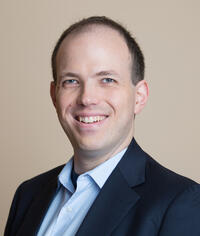“I chose Illinois originally because I got a real sense of community from the grad students and professors when I visited. At Illinois I got incredible opportunities, not just for the breadth of mathematics I was able to learn, but also for pursuing my passion for teaching. As a graduate student, I was able to teach a course on my own, reporting to a course supervisor but able to innovate my own materials. I was also able to pursue classes in the education department, which allowed me to better understand education research and the realities of educational achievement—which proved to be crucial in my future career.“
Since graduating from Illinois with two masters degrees (MS Teaching of Mathematics 2008, MS Mathematics 2009), Daniel Zaharopol has founded two education non-profit programs: Learning Unlimited and Bridge to Enter Advanced Mathematics (BEAM). Dan decided that the best use of his love of and training in mathematics was to open the mathematics community to underserved students. For the past few years, Dan’s focus has been on BEAM, which provides a comprehensive 6th-12th grade pathway for underserved students to become scientists and mathematicians.
In 2009, Zaharopol helped found Learning Unlimited, a non-profit organization designed to replicate MIT’s Splash program at campuses across the country. The Splash concept gives middle and high school students the opportunity to take one-day classes taught by college students in a variety of areas not traditionally seen in school. He served as CEO of Learning Unlimited (which now coordinates 33 Splash-style programs in 13 states and the UK) from 2009 to 2015.
It is well known that women and minorities are not well represented in mathematics and other STEM disciplines. Those that come from low-income families or who attend struggling schools are particularly disadvantaged. Determined to do something about this problem, Zaharopol founded the BEAM program in 2011. He partnered with middle schools in New York City to identify talented students from underserved populations. BEAM’s students come from households in which the median annual income is $25,000. Students are selected based on teacher recommendations, a screening test, and performance on math problems sent home. Those chosen are invited to a five-week intensive summer program after 6th grade, and can apply to continue to a three-week residential summer program after 7th grade where they take seven hours of math per day. Students choose courses in advanced topics often only taught in college, such as number theory, combinatorics, astrophysics, and programming. Students are on a first-name basis with their instructors, who are top educators from across the country, including university professors and middle school and high school teachers. BEAM is the main project of the Art of Problem Solving Initiative, where Zaharopol serves as the executive director, and has led through tremendous expansion.
A profile article in Forbes magazine featured Zaharopol as one of only four 2017 winners of the Richard C. Cornuelle Award for Social Entrepreneurship. This award, administered by the Manhattan Institute, recognizes some of the most promising social entrepreneurs and the new non-profits they’ve founded based on their own original ideas. In December 2017, he was also named one of “15 More People Changing the Nonprofit World” by The Chronicle of Philanthropy. BEAM itself has been featured in both the New York Times and Atlantic Monthly. In addition to media attention in the last few years, BEAM has joined the Edwin Gould Foundation’s Accelerator program, which also helped launch Teach for America.
Through his energy, vision, entrepreneurship and dedication, Zaharopol has created several educational programs that now reach thousands of students across the country, and has helped numerous students successfully enter college in STEM fields.
“Joining the math department at Illinois was an incredible experience,” Zaharopol says. “I still have many friends among my former professors and graduate student colleagues. In short, Illinois was an exceptional incubator for the kind of work I ended up doing, and I couldn’t be more grateful for the experience. This award only goes to further that goal: I’ll be able to use it to further grow BEAM and our work with students.”
